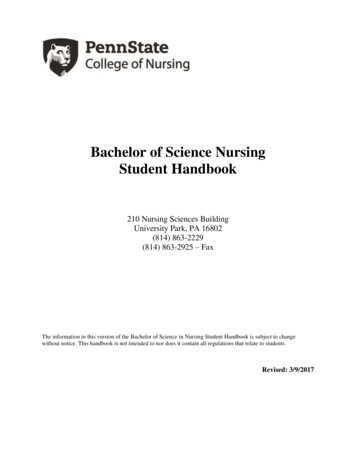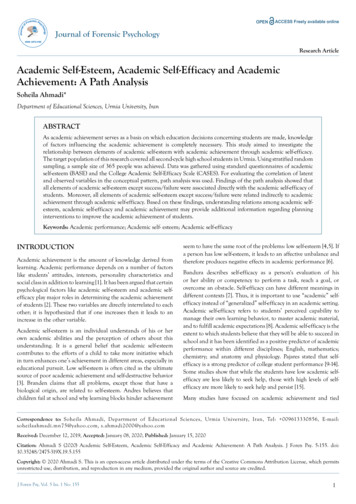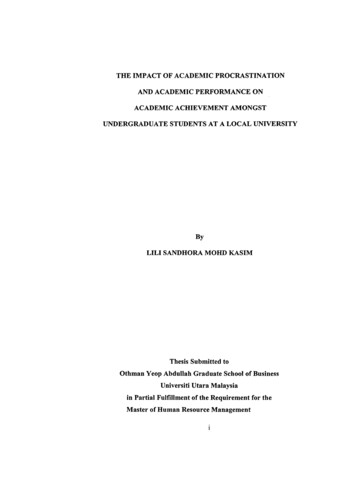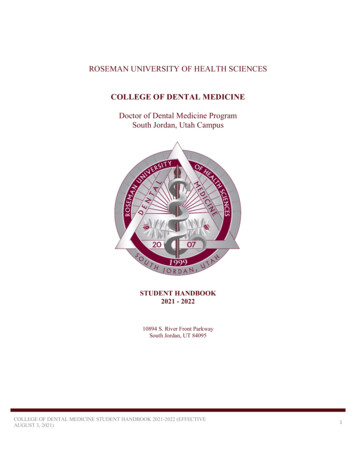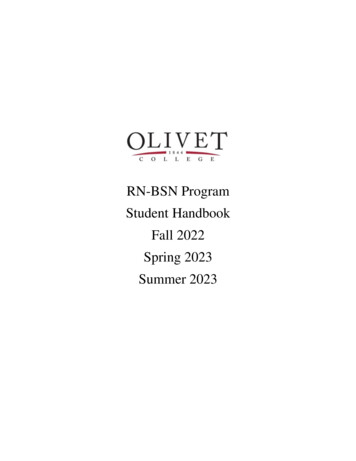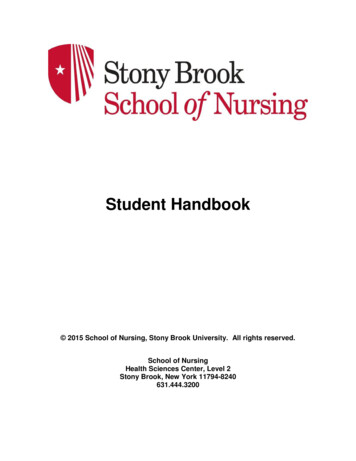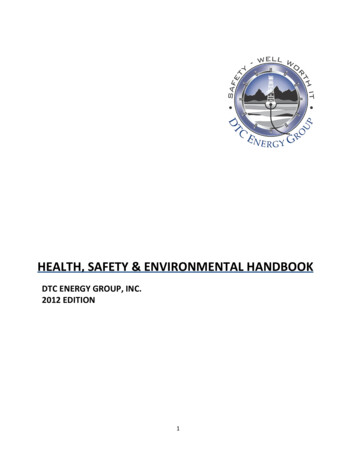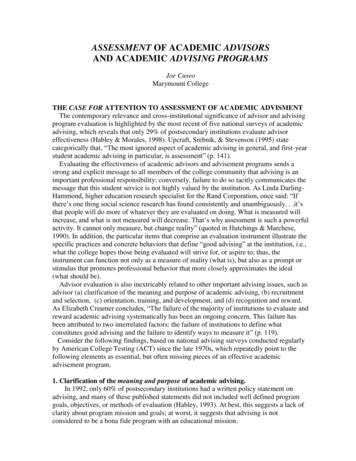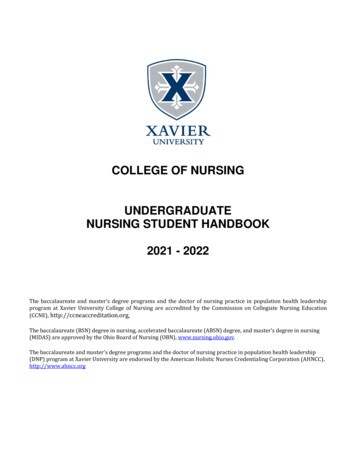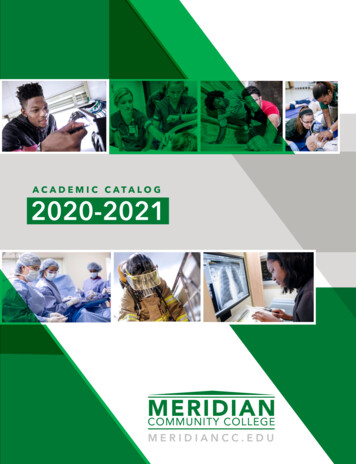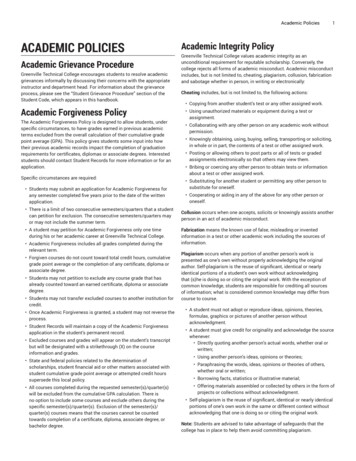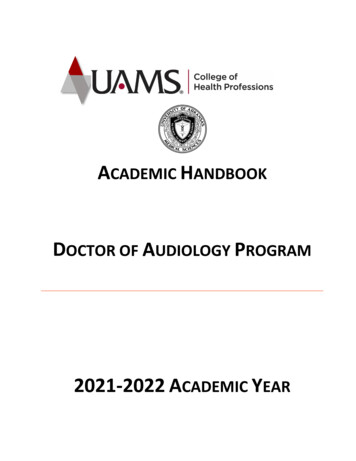
Transcription
ACADEMIC HANDBOOKDOCTOR OF AUDIOLOGY PROGRAM2021-2022 ACADEMIC YEAR
2INTRODUCTIONThe purpose of the UAMS AuD Academic Handbook is to familiarize you with various department andaudiology program guidelines that will be important for you during your program. If you have any questionsabout these or any other procedures, please do not hesitate to contact your academic advisor. If you do notknow who your advisor is, please see the program director.These guidelines are not all inclusive. You must also be aware of the policies and procedures contained inother publications developed by the department, college (College of Health Professions) and university(UAMS).FACULTY AND STAFFAudiology FacultySarah Allen, PhD, CCC-A, Assistant Professor, SAllen@uams.eduSamuel R. Atcherson, PhD, CCC-A, Professor, Director of Research, SRAtcherson@uams.eduCharia Hall, AuD, CCC-A, Assistant Professor, CHall@uams.eduM. Bryson Howard, AuD, CCC-A, Assistant Professor, Audiology Clinical Education Director,MBHoward@uams.eduCaitlin Price, PhD, CCC-A, Assistant Professor, CEPrice@uams.eduLaura Smith-Olinde, PhD, CCC-A, Professor, Department Chair and Audiology Program Director,lso@uams.eduAudiology Adjunct FacultyD. Bradley Davis, AuD, CCC-A, Instructor, DBradleyDavis@gmail.comPatti Martin, PhD, CCC-A, Associate Professor, MartinPF@archildrens.orgTerry (JR) McCoy, AuD, Instructor, Terry.McCoy2@va.govHolly Pruss, AuD, CCC-A, Instructor, MarvinHD@archildrens.orgRobert Traynor, EdD, MBA, Instructor, TraynorDr@gmail.comSpeech-Language Pathology FacultyDana Moser, PhD, CCC-SLP, Associate Professor, Speech-Language Pathology Program Director,DRMoser@uams.eduCharity Avery, MCD, CCC-SLP, InstructorPortia Carr, MS, CCC-SLP, Assistant ProfessorBarbara Jones, MS, CCC-SLP, Instructor, BJones3@uams.eduGreg Robinson, PhD, CCC-SLP, Associate Professor, GCRobinson@uams.eduAndrea Toliver-Smith, PhD, CCC-SLP, Assistant ProfessorShana Williamson, MS, CCC-SLP, Instructor, speech-Language Pathology Clinical Education Director,SFWilliamson@uams.eduAdministrative StaffLaura Bertram, Research Assistant, LLBertram@uams.eduChristina Lee, Executive Assistant, CLee@uams.eduNatasha Stephens, Clinic Manager, NYStephens@uams.eduRev. 8-16-21
3CONTENTSIntroduction2Faculty and Staff2Audiology Faculty2Audiology Adjunct Faculty2Speech-Language Pathology Faculty2Administrative Staff2Departmental Mission Statement7ASP Statement of Solidarity7UAMS Academic Affairs Policy 2.1.3 – Non-Discrimination Statement7AuD Program Mission Statement7Goals of the AuD Program8Educational Objectives of the AuD Program8The Profession of Audiology8Program Accreditation8Prerequisite Courses9Curriculum9Performance Standards for the Doctor of Audiology Program11Essential Functions11Professionalism14Student Conduct and Discipline14Student Progression Policy14Expected Performance15Remediation16Rev. 8-16-21Policies16Procedures17
4Probation18Policies18Procedures18Consequences of Probation18Return to Good Standing Status (Release from tmental and College Grievance Procedures19Advising24Initial Assignment24Academic Advising25Academic Difficulty25Graduation Requirements26Capstone Experience26Clinical Experiences27Knowledge and Skills Acquisition27Comprehensive Examination27AuD Program Administrative Policies28Attendance28Blackboard29Class and Clinic Hours29Dress Code30In-person and Online Classroom Etiquette30Copying Equipment30Inclement Weather Policy30Rev. 8-16-21
5Leave of Absence31Modification of Program Requirements31Official Correspondence31Outside Employment31Social Media31Student Records32Title IX32UAMS Student Services32General Departmental Information33Building Hours33Bulletin Boards33Calendar of Events33Change of Address33Computer Availability34Office Supplies34Student Lounge34Senior Leadership Team34Student Liaison Group34Student Lockers34Student Mailboxes34Health Related Issues34Immunizations and Tuberculosis Testing34Student Liability Insurance Coverage35Licensure35Professional Memberships, Development and Service35Appendix A36Rev. 8-16-21Scopes of Practice
6Appendix BAssurances37Appendix CAudiology Acknowledgement of Professional Conduct42Appendix DAdvising Documents45Appendix EComprehensive Examination49Appendix FArkansas Licensure information50Appendix GUAMS Covid Guidelines for Academic Activities51Rev. 8-16-21
7DEPARTMENTAL MISSION STATEMENTThe mission of the Audiology and Speech Pathology (ASP) department is to educate professionals whoserve persons with communication, swallowing, and balance disorders at the local, state, national, andinternational levels. The department is dedicated to excellence in: (a) teaching and lifelong learning in astudent-centered environment, (b) service in a patient-centered environment based on academicexcellence, leadership, and the ethic of community responsibility, and (c) research that supportscommunication science and the practice of audiology and speech-language pathology (ASP Strategic Plan,2018).ASP STATEMENT OF SOLIDARITYThe UAMS Department of Audiology and Speech Pathology stands in solidarity with Black, Indigenous andPeople of Color during this time of heightened cultural awakening to years of societal oppression andsystemic racism. We support our colleagues, students, clients and patients of color. We join in mourningthe unjust deaths of countless Black Americans who have suffered from systemic racism throughout theyears. We, as an academic department, commit to examining and re-examining biases within ourselves, ourpolicies and procedures, and metrics aligned with ensuring student access and success. We commit toeducating ourselves and our students to ensure increased diversity, equity, and inclusion within ourdepartment and thus, society at large. We commit to learn and change as we actively listen to the livedexperiences of persons from oppressed minority groups. We further commit to recognizing, understanding,and educating others about the societal and systemic obstacles facing individuals at the intersection ofrace, ethnicity, sexual orientation, gender identity/expression, ability, culture, religion, and national origin.UAMS ACADEMIC AFFAIRS POLICY 2.1.3 – NON-DISCRIMINATION STATEMENTIt is the policy of the University of Arkansas Medical Sciences and all of its affiliated colleges and organizations notto engage in discrimination or harassment against any person because of race, color, religion or creed, sex, gender,gender identity, pregnancy, national or ethnic origin, non-disqualifying disability, age, ancestry, marital status,sexual orientation, veteran status, political beliefs or affiliations, and to comply with all federal and state nondiscrimination, equal opportunity and affirmative action laws, orders and regulations, including remainingcompliant and consistent with the Civil Rights Act; the Americans with Disabilities Act; the Rehabilitation Act of1973; and Title IX of the Education Amendments of 1972.AUD PROGRAM MISSION STATEMENT The mission of the Doctor of Audiology (AuD) program is to:o recruit and retain excellent students who are committed to the profession of audiology and thedelivery of high quality clinical services;o provide students with a solid foundation in the science of hearing and balance and the skills toconduct and promote evidence-based clinical practice;o develop audiologists who have the diagnostic and rehabilitative clinical skills necessary to fulfillthe current scope of practice in a culturally sensitive manner across the lifespan in a widevariety of settings.Rev. 8-16-21
8GOALS OF THE AUD PROGRAMThe goals of the Audiology Program include producing audiology graduates who will demonstrate theknowledge and skills necessary to: competently evaluate children and adults for hearing and balance disorders; provide appropriate intervention for children and adults with hearing and balance disorders; understand and evaluate research in the field of audiology and related areas; apply evidence based practice principles in the assessment and treatment of hearing and balancedisorders; and understand and apply the principles of ethical and professional conduct.EDUCATIONAL OBJECTIVES OF THE AUD PROGRAMStudents will demonstrate the knowledge and skills to meet the objectives as outlined by the Council onAcademic Accreditation in Audiology and Speech-Language Pathology (CAA) of the American SpeechLanguage-Hearing Association (ASHA). The doctoral academic and clinical curriculum in audiology mustinclude instruction in the areas of: (a) foundations of audiology practice, (b) identification and prevention ofhearing loss, tinnitus, and vestibular disorders, (c) assessment of the structure and function of the auditoryand vestibular systems, (d) assessment of the impact of changes in the structure and function of theauditory and vestibular systems, and (e) intervention to minimize the effects of changes in the auditory andvestibular systems on an individual’s ability to participate in their environment. Students will alsodemonstrate professional practice competencies, including accountability, integrity, effectivecommunication skills, clinical reasoning, evidence-based practice, concern for individuals served, culturalcompetence, professional duty, and collaborative practice.Students will demonstrate the knowledge and skills to meet the clinical competencies as outlined by theCouncil for Clinical Certification (CFCC) of the ASHA. The clinical curriculum in audiology must includeclinical and/or simulated clinical experiences in the areas of: (a) prevention, screening and identification, (b)assessment (audiometrics), (c) assessment (special tests), (d) audiologic (re)habilitation, (e) pediatricaudiologic (re)habilitation, (f) counseling, (g) communication, and (h) professional practice.THE PROFESSION OF AUDIOLOGYAudiologists are health care professionals who are experts in the non-medical management of the auditoryand balance systems. Audiologists evaluate hearing and hearing loss; recommend, fit, and verify personalamplification and sound access systems; assist in school-based amplification decisions; evaluate thevestibular system, as well as many other activities. Graduates of this program are prepared for positions ina variety of professional settings including hospitals and private otolaryngology clinics; private practice;community speech, language, and hearing centers; college and university programs; rehabilitation centers;residential institutions; school systems; and industrial settings (see Appendix A for links to the ASHA andAAA Scopes of Practice).PROGRAM ACCREDITATIONThe doctoral (AuD) education program in audiology at the University of Arkansas for Medical Sciences isaccredited by the Council on Academic Accreditation in Audiology and Speech-Language Pathology of theAmerican Speech-Language-Hearing Association, 2200 Research Boulevard, #310, Rockville, MD 20850,800-498-2071 or 301-296-5700.Rev. 8-16-21
9PREREQUISITE COURSESAt least one undergraduate course in each of mathematics (college algebra or higher), a biological science,a physical science (chemistry or physics), a behavioral science, and statistics is required. Although there areno prerequisite courses in audiology or speech pathology, the program requires that all students have onecourse in phonetics and one in language acquisition. If these courses are not completed prior to admission,they must be completed during the first three semesters of the program.CURRICULUMA minimum of 104 semester credits (SC) are required in the program. The following 104 credit sampledegree plan demonstrates a program that meets the credit minimum.Course #Y1 FallAUDI 5023AUDI 5043AUDI 5053AUDI 5113AUDI 5401AUDI 5041Y1 SpringAUDI 5073AUDI 5193AUDI 5103AUDI 5223AUDI 5401AUDI 5041TitleCreditsBasic Diagnostic AudiologyAnatomy and Physiology IAcoustics and PsychoacousticsAmplification IAudiology PracticumClinical Laboratory 133331114Advanced Diagnostic AudiologyAnatomy and Physiology IIHearing Disorders and GeneticsAmplification IIAudiology PracticumClinical Laboratory 233331114Y2 SummerAUDI 5222AUDI 5401Research Methods and Evidence-basedPracticeProfessional Issues and EthicsAudiology PracticumY2 FallAUDI 5153AUDI 5083AUDI 5192AUDI 5342AUDI 5401AUDI 5041Pediatric Diagnostic AudiologyClinical ElectrophysiologyCultural Competence in AudiologyTinnitus and HyperacusisAudiology PracticumClinical LaboratoryAUDI 5013Y2 SpringRev. 8-16-21321633222113
10AUDI 5233AUDI 5173AUDI 5263AUDI 5212AUDI 5401AUDI 5361AUDI 5041Pediatric Amplification and InterventionCounseling in Communication DisordersBalance in Adults and ChildrenHearing ConservationAudiology PracticumDirected ResearchClinical Laboratory333221115Y3 SummerAUDI 5232AUDI 5401AUDI 5361Audiology: Practice ManagementAudiology PracticumDirected Research2226Y3 FallAUDI 5283AUDI 5033AUDI 5273AUDI 5361AUDI 5401Gerontology in AudiologyEducational AudiologyImplant Device TechnologyDirected ResearchAudiology Practicum2331211Y3 SpringAUDI 5243AUDI 5063AUDI 5401AUDI 5041AUDI 5203Audiologic RehabilitationAuditory ProcessingAudiology PracticumClinical LaboratoryTopics in Audiology322119Clinical Externship4Clinical Externship6Clinical Externship6104Y4 SummerAUDI 5461Y4 FallAUDI 5461Y4 SpringAUDI 5461TOTALSee the AuD website for course descriptions.This course work represents a minimum of 66 credits of classroom courses, 4 credits in a capstone project,5 credits of clinical laboratory, 13 credits of practicum, and 16 credits of clinical externship during the finalacademic year.Rev. 8-16-21
11PERFORMANCE STANDARDS FOR THE DOCTOR OF AUDIOLOGY PROGRAMEssential FunctionsINTRODUCTIONIn order to acquire the knowledge and skills requisite to the practice of speech-language pathology oraudiology, to function in a broad variety of clinical situations, and to render a wide spectrum of client care,students must have essential skills and attributes in five areas: communication, motor/physical health,intellectual-cognitive, sensory-observational, and behavioral-social. These skills enable a student to meetgraduate and professional requirements as measured by state and national credentialing agencies. Many ofthese skills can be learned and developed during the course of the graduate program through courseworkand clinical experience. Failure to meet or maintain essential functions may result in action against thestudent, including, but not limited to, dismissal from the program. The documents to be signed can befound in Appendix B.POLICYThe accredited graduate programs in speech-language pathology and audiology of the University ofArkansas for Medical Sciences (UAMS), Department of Audiology and Speech Pathology (ASP) adhere to thestandards set by the American Speech-Language-Hearing Association (ASHA). Within ASHA standards, theAuD program has the freedom and ultimate responsibility for: the selection of students; the design,implementation, and evaluation of the curriculum; the evaluation of student progress; and, thedetermination of who should be awarded a degree.The AuD faculty have a responsibility for the welfare of clients tested, treated, or otherwise affected bystudents enrolled in the program. The department has the responsibility to the public to assure that itsgraduates can become fully competent audiologists and speech-language pathologists, capable ofdelivering quality care in a timely manner and preserving the well-being of the clients they serve. Thus, it isimportant that persons admitted, retained, and graduated possess the intelligence, integrity, compassion,humanitarian concern, and the physical and emotional capacity necessary to practice speech-languagepathology or audiology.The Department of Audiology and Speech Pathology, as part of the College of Health Professions, iscommitted to the principle of equal opportunity. The University, College, and Department do notdiscriminate on the basis of race, color, religion or creed, sex, gender, gender identity/expression, pregnancy,national or ethnic origin, non-disqualifying disability, age, ancestry, marital status, sexual orientation, veteranstatus, or political beliefs or affiliations. When requested, the University, College, and Department will providereasonable accommodations to otherwise qualified students with properly certified disabilities. The AuDfaculty has responsibility for the welfare of students in the department. In order to fulfill this responsibility,the department has established academic standards and minimum essential function requirements thatmust be met, with or without reasonable accommodations, in order to participate in the program andgraduate.Essential FunctionsCommunicationA student must possess adequate communication skills to:Rev. 8-16-21
12 Use speech, hearing, vision, and the English language to communicate effectively with clients,faculty, staff, peers, and other health care professionals in both oral and written form.Communicate effectively and efficiently in oral and written forms including classroom projects,presentations, research, and clinical reports.Modify their communication style to meet diverse communicative needs.Communicate in a succinct, yet comprehensive manner and in settings where time limits maybe imposed.Assess and effectively communicate all relevant information including the significance of nonverbal responses.Assess incoming information to allow for appropriate, well-focused follow-up inquiries.Listen responsively and empathetically to establish rapport in a way that promotes opennesson issues of concern and sensitivity to potential cultural differences.Express their ideas and feelings clearly and demonstrate a willingness and ability to give andreceive feedback.Motor/Physical Health/TransportationA student must possess adequate motor skills and physical health to: Execute movements reasonably required to move from area to area, maneuver in small places,use equipment, materials and technology as needed to provide clients with appropriate care.Access transportation to clinical and academic placements.Provide for and practice personal hygiene.Possess the physical health and stamina needed to carry out the speech-language pathologyand audiology programs.Have sufficient use of gross and fine motor skills to carry out all necessary clinical procedures,both those involved in learning the fundamental sciences and those required in the clinicalenvironment.Intellectual / CognitiveA student must possess adequate intellectual and cognitive skills to: Rev. 8-16-21Participate in clinical settings and achieve the levels of competence required by the academicand clinical faculty and off-campus preceptors.Solve problems critical to the practice of speech-language pathology and audiology.Self-evaluate, identify, and communicate limits of one’s own knowledge and skills.Identify and use resources to increase knowledge and skills.Use detailed written and verbal instruction to make unique and independent decisions.Measure, calculate, reason, analyze, synthesize, and create as needed in the academic andclinical arenas.Demonstrate the mental capacity to learn and assimilate professional information including theability to read and comprehend professional literature and reports.Solve clinical problems through critical analysis.Seek relevant case information, synthesize, and apply concepts and information from varioussources and disciplines.Maintain attention and concentration for sufficient time to complete clinical activities.Write discipline-specific papers and clinical reports in English. These must be professional andgrammatically correct.Schedule and prioritize activities.
13 Demonstrate the ability to master information presented in course work in the form oflectures, written materials, projected images, and lab activities.Acquire the information presented through demonstrations and experiences in the clinicaltraining portion of the programObserve clients accurately and interpret non-verbal communication when performing clinicalassessments and treatment activities.Sensory / ObservationalA student must possess adequate senses of vision and hearing to: Accurately observe clients and interpret and analyze their behaviors.Treat clients and use equipment appropriately.Visually monitor client responses and materials.Make accurate judgments about speech and/or acoustic signals.Behavioral / SocialA student must possess adequate behavioral, ethical, emotional, and social attributes to: Display mature, empathetic, and effective relationships by exhibiting compassion, integrity, andconcern for others.Recognize and show respect for individuals of different ages, gender identities/expressions,races, religions, sexual orientations, cultural and socioeconomic backgrounds, and abilities.Recognize and make adjustments when a client’s family does or does not understand theclinician’s written and/or verbal communication.Maintain generally good emotional and mental health to fully use their intellectual abilities andexercise good judgment including prompt completion of all academic and clinicalresponsibilities. Seek assistance when needed.Display good judgment and behave in a professional, reliable, mature, and responsible manner.Demonstrate flexibility and adaptability to function in new and stressful environments.Evaluate their own performance and be forthright about errors, accept constructive criticism,and look for ways to improve academic and clinical performance.Exhibit professional appearance and demeanor by conforming to appropriate standards ofdress, appearance, language, and public behavior, including social media.Uphold the Code of Ethics of the American Speech-Language-Hearing Association and/or theAmerican Academy of Audiology, the Health Information Privacy and Accountability Act, as wellas the departmental Honor Code.Candidates for the Master of Science in Communication Sciences and Disorders (MS) or the Doctor ofAudiology (AuD) who have been accepted for admission will be required to verify that they understand andmeet these essential functions. Admission decisions are made on the assumption that each candidate canmeet the essential functions and fulfill essential functions without consideration of disability.The UAMS ADA/Disability Services office will review a student’s request for accommodation and confirmthat the stated condition qualifies as a disability under applicable laws.If an applicant states they can meet the essential functions with accommodation, the department, workingwith the ADA officer and the Associate Dean for Academic Affairs, will determine the most appropriateaccommodation(s) so that the student can meet the essential functions. This determination includes areview of whether the accommodation would jeopardize client safety or the educational process of theRev. 8-16-21
14student or the institution, including all coursework and internships/practicum placements deemed essentialto graduation. At any time in the course of a student’s enrollment in the department, should their needschange, the student can request accommodation through the UAMS ADA/Disability Services office. Thestudent will also update the Essential Functions document on file with the department.Reference: Adapted from the Council of Academic Programs in Communication Sciences and Disorders(2007) Rev. 8-12-09PROFESSIONALISMProfessionalism in health care and education is based upon values that reflect the very special nature of theinteraction between a provider and a patient, client, or family and between a teacher and student.Individuals confronting illness, social disruption, or other life-changing challenges are vulnerable.Individuals learning the knowledge, skills, and attitudes of a profession face many new challenges. Patientsand students rely upon professionals to address their needs in an expert, professional manner. All whowork with patients and their families and those who work with students are expected to act in accordancewith the standards of professional conduct outlined in Appendix C. The student’s signature on the StudentAcknowledgement of Professional Conduct verifies the student’s understanding and knowledge of thehighest ethical standards of their discipline, as well as agreeing to abide by those standards and theconsequences of failing to uphold them.There are core values of professionalism that are universal and apply to those in health care professionsand in education. These include, but are not limited to, moral values such as honesty, integrity, andtrustworthiness; values that are specific to one’s profession (e.g., confidentiality), to society (e.g.,commitment to excellence), to oneself (e.g., self-reflection), and to humanistic values such as empathy andcompassion.STUDENT CONDUCT AND DISCIPLINEAll academic work in the UAMS AuD program will be conducted under the UAMS CHP Scholastic DishonestyPolicy (01.00.02). Academic misconduct in any form will not be tolerated in the UAMS AuD degree program.Students are referred to the UAMS Catalog, Section 9 – Student Conduct & Discipline for the completepolicy.A Student Honor Code is one of the most important assurances signed by each AuD student in theDepartment of Audiology and Speech Pathology upon entering the graduate program. This assurance canbe found in Appendix B. The signed Honor Code will be placed in the student’s academic file. The HonorCode pledge verifies the student’s understanding and knowledge of the highest ethical standards of theirdiscipline, as well as agreeing to abide by those standards and the consequences of failing to upholdthem.STUDENT PROGRESSION POLICYThe AuD program is committed to successfully educating and graduating new audiologists. We also arecommitted to excellence in academic, clinical and scholarly activities. The following expected performanceitems are designed to reflect that commitment to excellence.The AuD program faculty and academic advisors continually monitor and document student progress inorder to identify deficits in knowledge or skills and establish remediation measures. Students concernedRev. 8-16-21
15about their progress may request an Advising Session with their academic advisor at any time to addressthose concerns.The AuD program also conducts formal reviews of academic and clinical progress. The audiology facultymeet as a committee of the whole to review all students’ progress mid-semester, at the end of eachsemester, and on an as-needed basis. These reviews are supportive in that they are designed to identifyacademic and/or clinical areas that need remediation for the student to successfully progress through theAuD program.Expected PerformanceExpected academic and clinical performance includes but is not limited to the items below. Students are expected to earn grades of B or better in each course and at a minimum maintain anoverall grade point average of 3.00 to remain in good academic standing.Pass first and second semester clinical performance-based evaluations, administered on a highpass/low pass (needs remediation)/fail basis.Pass the comprehensive examination, administered on a high pass/low pass (needsremediation)/fail basis.Complete all didactic coursework (with overall GPA of 3.0 or higher and no more than 2 “C” coursegrades) before beginning the 4th year externship.Consistently meet professional standards as rated by faculty, staff, and community partners in theprofessional practice section of Calipso (minimally 3.5 on a 5.0 scale), meet the four professionalattributes listed as Met/Not Met in Calipso, and as in Appendix C.Acknowledge and follow the CHP Scholastic Dishonesty Policy and the CHP Student Conduct andDiscipline Policy (01.00.02).Create an environment that values each individual including patients, classmates, instructors,preceptors, and staff, following the federal civil rights law, Title IX, the CHP/ASP Professionalismpolicies (Non-Cognitive Performance Standards, 02.00.02) as well as the ASP Statement ofSolidarity.Notes: Should an “Incomplete” be needed in any academic or clinical course, the work must be completedand submitted by finals week of the following semester. It is the faculty member’s responsibility tograde and issue a grade change form by the end of that semester.If at any time an instructor is concerned about student performance, they may refer the student tothe UAMS Student Success Center (SSC). The faculty member will note the referral in the student’sfile. SSC personnel will meet with the student and decide on a course of action, as needed. The SSCwill keep the program informed about student participation in the process, which will also berecorded in student’s file. Non-participation by the student can result in remediation or probationand will be decided on a case-by-case basis.Professionalism InfractionsPoliciesStudents are expected to follow professionalism standards (e.g., Appendix C). Students may receive aprofessionalism infraction report for (this list is not exhaustive): Unexcused absence(s) at required clinic and program functions and eventsRev. 8-16-21
16 Tardiness at required non-practicum program functions and events, 15 minutes or more after theofficial start timeo Note: any amount of tardiness requires a phone call as a professional courtesy, preferablyahead of time, or at the time of occurrenceViolations ofo ASP Dress codeo HIPAAo Code of ethicsUnauthorized use or taking of clinical materialsPoor communication witho Facultyo Preceptorso Client(s)o Client familiesLack of personal hygieneIncautious use of social mediaOtherStudents will receive a remediation plan after the first three professional infraction reports. Students willreceive a remediation plan for each individual professionalism infraction after the third. Students may bedismissed after a third remediation plan.ProceduresIf a student commits a professionalism infraction, the faculty member who
In-person and Online Classroom Etiquette 30 Copying Equipment 30 Inclement Weather Policy 30. 5 . Rev. 8-16-21 . . Council for Clinical Certification (CFCC) of the ASHA. The clinical curriculum in audiology must include . no prerequisite courses in audiology or speech pathology, the program requires that all students have one .

